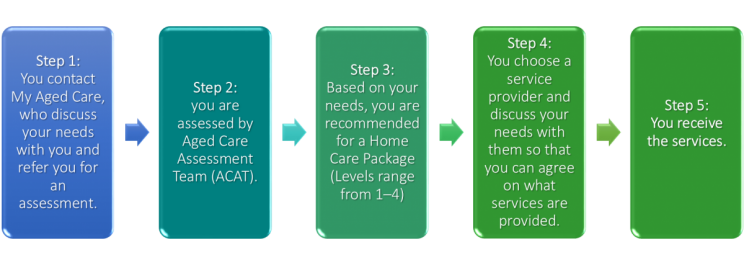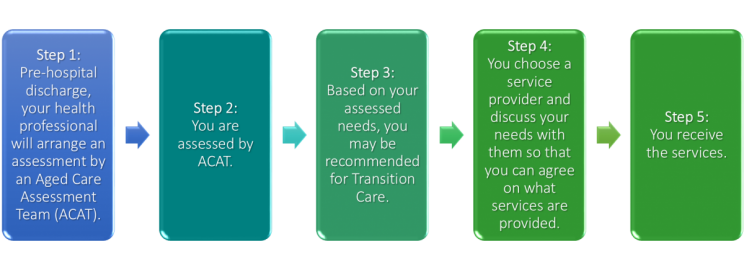Department of Health services and costs
On this page
Veterans and war widow(er)s, as Australian citizens, have the right to access non-DVA administered home and community based support services (or 'mainstream' services) offered by the Department of Health, that include:
- Commonwealth Home Support Program (CHSP)
- Home Care Packages
- Transition Care
- Short-Term Restorative Care (STRC).
When a veteran's or war widow(er)'s care needs change (for example, increase or become more complex) they may require additional services or more targeted services. This means a veteran or war widow(er) may need to transition to services which are the responsibility of the Department of Health, such as Home Care Packages or residential aged care. DVA clients can access both DVA services and 'mainstream' services supplied by the Department of Health, as long as there is no duplication of services.
Eligibility for aged care services supplied by the Department of Health is different to the eligibility requirements for DVA services; these requirements are based on age, with Aboriginal and Torres Strait Islander people required to be over the age of 55 and non-indigenous people must be over the age of 65.
Back to topCommonwealth Home Support Program
The Commonwealth Home Support Program (CHSP) helps people (including veterans and war widow(er)s) who need assistance with daily tasks in the home, or entry level care. CHSP services include:
- Social support
- Transport
- Domestic assistance
- Personal care
- Home and garden maintenance
- Community based respite
- Delivered meals and food services.
A free assessment by a member of a Regional Assessment Services (RAS) is required to access services provided by the CHSP.
Cost
People receiving CHSP may be asked to pay a contribution to the cost of delivering these services.
The process for accessing CHSP services is outlined in the following:

For more information about CHSP:
- visit My Aged Care, or
- call the My Aged Care contact centre on 1800 200 422.
Home Care Packages
Home Care Packages are available for people (including veterans and war widow(er)s) who have more complex needs and wish to remain living in their homes.
There are four levels of packages to cater for different needs. Funding is allocated to each level of package by the Department of Health, in accordance with need, as outlined in the following table:
| Package level | Aged care services for people with | Yearly subsidy up to approximate* value of |
|---|---|---|
| 1 | Basic care needs | $8,750 |
| 2 | Low-level care needs | $15,500 |
| 3 | Intermediate care needs | $34,000 |
| 4 | High-level care needs | $51,500 |
* The maximum government contribution increases each year. The individual amount that is paid will depend on whether you need to pay an income tested care fee.
The same type of care and services are provided under each level. The hours of care are increased at each level of care; more hours of care and services are delivered under Home Care Package level 4 compared to level 1.
A free assessment by a member of an Aged Care Assessment Team (ACAT, or Aged Care Assessment Service, ACAS, in Victoria) is required to access Home Care Packages.
In some areas there may be a waitlist to receive a Home Care Package. In these cases veterans and war widow(er)s are encouraged to contact DVA to determine if interim services are able to be provided.
From 27 February 2017, funding for a Home Care Package will follow the client, allowing them to direct funding to the approved provider of their choice. These changes replace the previous arrangements whereby Home Care Packages were allocated to approved providers who determined whether they had the capacity to take on a client once they were approved for a Home Care Package by an Aged Care Assessment Team (ACAT). A new process, managed through My Aged Care, will deliver a consistent national system for assigning Home Care Packages to eligible clients. All Home Care Packages continue to be delivered through a Consumer Directed Care (CDC) approach. This approach allows clients to have greater control over their package in terms of the services to be accessed and the delivery of these services.
Cost
DVA clients accessing Department of Health aged care services will be asked to contribute to their care based on what they are assessed as being able to afford. Costs can be estimated by using the following My Aged Care link Fee estimator for Home Care Packages.
Fees are payable for every day you hold a Home Care Package, and generally paid fortnightly or monthly. The Government also pays subsidy and supplements to the provider every day. Your fees and the contribution made by the government go towards the overall funding of your package and contribute to the provision of services on the days you receive them.
Note
DVA covers the Basic Daily Fee cost for former Prisoners of War (POW) and Victoria Cross (VC) recipients requiring a Home Care Package.
Home Care income test assessments
DVA is responsible for completing the home care income test assessments for:
- Veterans, their partners and war widow(er)s in receipt of one of the following DVA income support pensions -
- service pension
- income support supplement, or
- age pension administered by DVA
- Veterans in receipt of DVA Disability Compensation Payment and who have qualifying service
- War widow(er)s in receipt of DVA war widow(er)'s pension and income support supplement.
Services Australia is responsible for completing the home care income test assessments for all other DVA clients (for example, veterans who do not have qualifying service or war widow(er)s not paid an income support pension by DVA).
In order to ensure the income data DVA includes in your assessment is up to date, you will need to provide an update of your details by completing the Services Australia form: SA456 — Home Care Package Calculation of your cost of care, or may be provided to you by the ACAT officer.
Once DVA completes your income test assessment, the information is provided to the Services Australia which will complete the applicable aged care fee calculations. Services Australia will then send you, your nominee and home care provider, letters advising the applicable home care fees payable.
Assessment of DVA Disability Compensation Payment and war widow(er)'s pension as income
It is important to be aware that unless you have had your qualifying service determined and accepted by DVA, then your Disability Compensation Payment will be included as income in your home care income test assessment.
If you are unsure of whether you have previously had your qualifying service determined, contact DVA on 1800 VETERAN (1800 838 372).
If you receive war widow(er)'s pension, this will be included as income in your home care income test assessment.
If you are a member of a couple, half of the combined income of you or your partner are taken into account for the assessment.
It isn't compulsory to submit a completed Services Australia form: SA456 — Home Care Package Calculation of your cost of care, but if you choose not to do so, you may be asked to pay the maximum fees.
The process for accessing Home Care Packages is detailed below:

The booklet Your guide to home care package services guides older people, families and carers to understand the process for accessing a Home Care Package.
For more information about Home Care Packages:
- visit My Aged Care or
- call the My Aged Care contact centre on 1800 200 422.
Transition Care
Transition Care is for older people (including veterans and war widow(er)s) who have been in hospital, but need more help to recover. Transition Care provides short-term care that may include:
- low-intensity therapy such as physiotherapy (exercise, mobility, strength and balance) and podiatry (foot care)
- access to a social worker
- nursing support for clinical care such as wound care
- personal care
Transition Care is available to all older Australians after they leave a hospital.
To receive Transition Care, a person will be assessed by an Aged Care Assessment Team (ACAT or Aged Care Assessment Service, ACAS, in Victoria) while still in hospital and the ACAT will determine if a person is eligible.
Cost
There is a Basic Daily Fee cost associated with Transition Care, which is based on the location where the care takes place. This could be approximately $10 per day if in a community setting or approximately $50 per day if in a residential facility.
Note
DVA covers the Basic Daily Fee cost for former Prisoners of War (POW) and Victoria Cross (VC) recipients requiring Transition Care.
The process for accessing Transition Care is outlined below:

For more information about Transition Care:
- visit My Aged Care or
- call the My Aged Care contact centre on 1800 200 422.
Short-Term Restorative Care
Short-Term Restorative Care (STRC) is a new kind of flexible care designed to assist older people (including veterans and war widow(er)s) regain independence and function after a setback, like an illness or a fall. Unlike Transition Care, STRC is intended as a preventive measure that will reduce and/or delay hospitalisation or premature entry into residential aged care for many older clients by providing services for a short period of time (up to 56 days). STRC services can be delivered either in the home, in an aged care setting, or a combination of both. There will be no prescriptive services for this program, rather all services must align with the principles of re-ablement and a multi disciplinary and coordinated package of services.
A free assessment by a member of an Aged Care Assessment Team (ACAT, or Aged Care Assessment Service, ACAS, in Victoria) is required to access STRC.
Cost
Like Transition Care, STRC has a Basic Daily Fee cost (client contribution), which is based on the location where the care takes place. This could be approximately $10 per day if in a community setting or approximately $50 per day if in a residential facility.
Note
DVA covers the Basic Daily Fee cost for former Prisoners of War (POW) and Victoria Cross (VC) recipients requiring STRC.
The process for accessing STRC is outlined below:

The booklet, Your guide to short-term restorative care, guides older people, families and carers to understand the process for accessing STRC.
For more information about STRC:
- visit My Aged Care, or
- call the My Aged Care contact centre on 1800 200 422.
